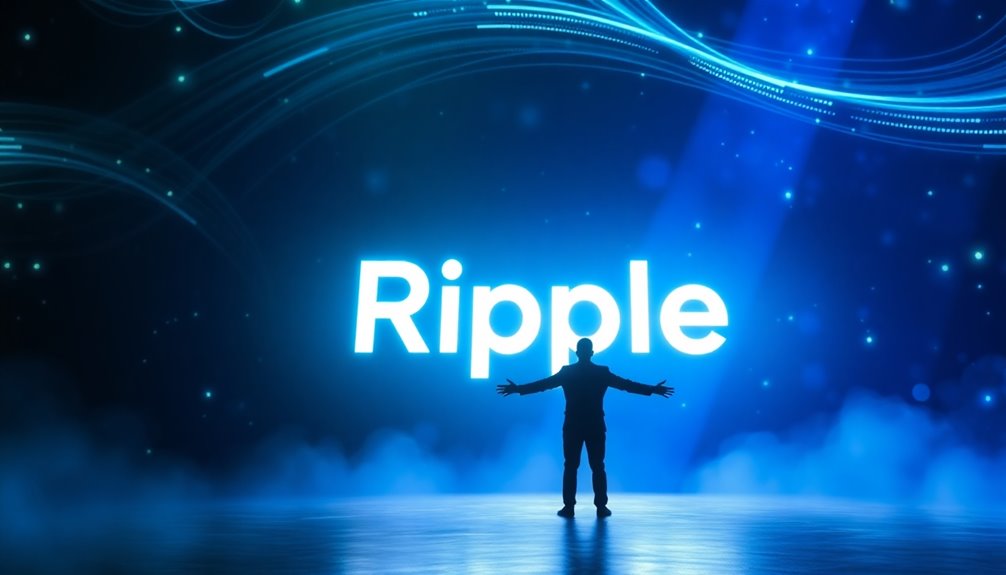Ripple's bold move to join the Pledge 1% initiative shows how the crypto world can embrace ethical responsibility. By committing to donate 1% of profits, Ripple has already supported significant causes, like giving $1 million to the International Rescue Committee. This initiative not only highlights philanthropic efforts but also aims to redefine crypto's ethical core by promoting transparency and social impact. Ripple's focus on financial inclusion, sustainable practices, and employee engagement sets a strong example for others in the industry. There's so much more to uncover about Ripple's plans—keep exploring to see how these efforts could shape the future of crypto.
Key Takeaways
- Ripple's commitment to the Pledge 1% initiative promotes corporate philanthropy, donating 1% of profits to charitable causes, aiming to redefine crypto ethics.
- The company has contributed $180 million globally since 2018, emphasizing financial inclusion and humanitarian aid, showcasing its dedication to social impact.
- Ripple's partnerships with organizations like UNHCR highlight its innovative approach to humanitarian aid, using blockchain for efficient resource distribution and cash relief.
- By pledging to achieve net-zero carbon emissions by 2030, Ripple addresses environmental sustainability, setting a standard for ethical practices in the crypto industry.
- Ripple's corporate culture encourages employee engagement in philanthropy, promoting a culture of giving that inspires ethical responsibility within the cryptocurrency sector.
Ripple Joins Pledge 1

Ripple has officially joined the Pledge 1% initiative, a global movement that encourages companies to donate 1% of their profits, products, or time to social causes. By taking this step, you can see how Ripple solidifies its commitment to creating meaningful change through partnerships with mission-driven organizations.
Launched in 2014, the Pledge 1% movement has over 18,000 participating companies from more than 130 countries, igniting billions in new philanthropy over the past decade. Ripple's participation also celebrates the movement's 10-year anniversary, highlighted by Pledge 1% ringing the Nasdaq closing bell.
This initiative aligns seamlessly with Ripple's historical philanthropic efforts. Since 2018, the company has donated over $180 million globally, focusing on blockchain innovation, financial inclusion, and humanitarian aid. Additionally, Ripple's involvement in community engagement showcases its commitment to inspiring collaboration for social change. Ripple's partnership with Pledge 1% aims at creating lasting social change by emphasizing inclusivity and sustainability. Furthermore, Ripple has invested $80 million in academic blockchain research to foster innovation and social impact.
Ripple's dedication to giving back demonstrates how you can leverage corporate resources to drive positive change, all while inspiring a culture of giving among employees. With its active local engagement and a robust donation-matching program, Ripple empowers its workforce to contribute to various causes, ensuring that the impact of its 1% pledge will resonate far beyond the corporate walls.
Focus Areas for Impact

As you explore Ripple's 1% Pledge, you'll notice a strong emphasis on advancing blockchain innovation and supporting humanitarian aid.
By investing in cutting-edge research and fostering partnerships, Ripple aims to harness technology for social good. This commitment not only enhances financial systems but also addresses critical humanitarian needs across the globe, as seen in their historical partnerships with organizations like UNHCR and World Central Kitchen. Additionally, Ripple's dedication to financial inclusion demonstrates their focus on improving access to essential services for disadvantaged populations. Furthermore, their initiatives, including the acquisition of 182,000 metric tons of carbon credits, highlight a comprehensive approach to addressing both social and environmental challenges. Herbal teas, known for their health benefits, can also play a role in promoting wellness among communities impacted by Ripple's initiatives. The integration of AI online jobs into their framework can further enhance operational efficiency and drive innovation in their projects. Ripple's efforts align with the principles of the Law of Attraction, showcasing how positive intentions can lead to meaningful change in the world. By prioritizing self-care practices, Ripple fosters a culture of well-being that can inspire others in the tech industry to follow suit.
Blockchain Innovation Advancement
Blockchain innovation advancement is reshaping industries by focusing on key areas like scalability, interoperability, and decentralization.
Layer 2 solutions, such as rollups, enhance scalability by processing transactions off-chain, increasing throughput and reducing costs. Sharding and side chains further distribute the network load, making blockchain technology more accessible. Cross-chain technology, including the Interledger Protocol, allows seamless data and value transfers across different platforms, boosting efficiency. Consensus algorithms ensure that all parties agree on the validity of transactions, further enhancing the security of these processes. The market for blockchain technology is projected to grow from $3.0 billion in 2020 to $39.7 billion by 2025, reflecting a strong demand for scalable solutions. Additionally, the implementation of decentralized ledger technology (DLT) enhances security and transparency, providing a robust foundation for these advancements. Natural Language Processing can also be utilized to improve user interfaces in blockchain applications, making them more intuitive. Furthermore, AI algorithms can aid in targeted advertising, ensuring that blockchain solutions reach the right audience effectively.
Interoperability thrives with pioneers like Polkadot and Cosmos, which create interconnected blockchains for greater flexibility. The Blockchain Interoperability Alliance promotes standards to enhance network communication, fostering a collaborative ecosystem. These advancements reveal new possibilities for innovation as diverse applications can now integrate and interact effortlessly. Moreover, focusing on mindset can help entrepreneurs in the blockchain space attract resources and opportunities for growth.
Decentralization is at the core of blockchain's appeal, empowering users through on-chain governance and decentralized applications.
Smart contracts automate processes, cutting out intermediaries and increasing efficiency. Projects like Civic and uPort offer decentralized identities, giving individuals control over their digital presence.
Humanitarian Aid Support
Advancements in technology, particularly in blockchain, are making a significant impact in humanitarian aid support. Ripple's partnership with the International Rescue Committee (IRC) exemplifies this, committing $1 million over multiple years to enhance cash relief programs across over 40 countries. By leveraging Ripple's blockchain technology and the RLUSD stablecoin, aid distribution becomes faster and more efficient, directly addressing the needs of vulnerable populations. This partnership highlights Ripple's commitment to humanitarian aid and its goal to enhance access to resources for communities in crisis. Furthermore, Ripple has established partnerships with over 50 academic institutions to promote research on blockchain applications in humanitarian efforts. Additionally, the partnership aims to utilize Ripple's expertise in cross-border payments to improve the speed of aid delivery.
Here's a breakdown of Ripple's humanitarian aid focus:
| Focus Area | Details |
|---|---|
| Cash Relief Programs | Over $70 million distributed to date. |
| Speed of Aid Distribution | Reduces delays in crisis zones. |
| Financial Inclusion | Supports unbanked populations globally. |
| Global Collaboration | Partners with organizations like Mercy Corps. |
| Employee Engagement | Donation-matching programs for local causes. |
These initiatives not only streamline aid delivery but also enhance financial inclusion in regions with limited banking access. By integrating blockchain solutions, Ripple is redefining the landscape of humanitarian support, ensuring that help reaches those who need it most, when they need it.
Financial Contributions Overview

How does Ripple demonstrate its commitment to social responsibility? By pledging 1% of its profits, products, or time to charitable causes, Ripple sets a powerful example for the crypto industry. Since joining the Pledge 1% initiative in 2014, the company has donated over $180 million to various global initiatives, focusing on blockchain innovation and financial accessibility.
Recent donations highlight Ripple's proactive approach to philanthropy. In May, it contributed $100,000 to flood victims in Brazil, while in October, a $1 million pledge went to the International Rescue Committee (IRC). Additionally, Ripple's participation in the Pledge 1% corporate philanthropy movement has encouraged other companies to adopt similar ethical practices. This commitment is further underscored by Ripple's substantial support from organizations, which accounts for majority funding in their overall contributions.
Ripple also committed $80 million to the University Blockchain Research Initiative (UBRI), supporting over 1,500 blockchain projects across 50 academic institutions in 26 countries. Additionally, the company has pledged $100 million to enhance voluntary carbon markets. Ripple's 1% Pledge financial contributions haven't only supported humanitarian efforts but also fostered financial resilience and environmental sustainability. With nearly 18,000 companies joining the Pledge 1% movement, Ripple's transparency and accountability in fund allocation inspire others to engage in philanthropy, reinforcing a culture of ethical business practices within the crypto space.
Strategic Partnerships and Collaborations

When you look at Ripple's strategic partnerships, you'll see a strong focus on investing in fintech startups and supporting humanitarian aid innovations. Their collaborations with academic institutions also highlight a commitment to advancing blockchain research and education. Ripple's partnership with Tenity's Incubation Fund II emphasizes their dedication to fostering innovation within the DeFi sector. These initiatives not only drive innovation but also position Ripple as a leader in the evolving financial landscape, especially as they align with their goal of enhancing blockchain adoption in the banking sector. Additionally, their collaboration with leading tech firms has strengthened their infrastructure for secure crypto trading.
Investing in Fintech Startups
Investing in fintech startups often hinges on strategic partnerships and collaborations that drive innovation and growth. By aligning with academic institutions, venture capital firms, and large tech companies, you can reveal new opportunities and enhance your impact on the market.
Consider the following key aspects of these partnerships:
- Academic Collaborations: Ripple's $80 million investment in the University Blockchain Research Initiative (UBRI) supports over 1,500 blockchain projects across 50 institutions worldwide, fostering innovation in fintech education. This approach exemplifies the human-centered approach that prioritizes user experience and needs. Additionally, the focus on high protein solutions can lead to more sustainable business models in the fintech space. Furthermore, such collaborations can also help address cognitive decline issues affecting the workforce, ensuring a more knowledgeable and capable talent pool. To maximize the benefits, these partnerships should also explore retirement savings options that empower students and faculty to plan for their financial futures. Incorporating principles from herbal alternatives can also inspire innovative health and wellness fintech solutions.
- Venture Capital Alliances: Partnering with Mercy Corps Ventures, Ripple aids over 50 fintech startups in emerging markets, securing more than $500 million in follow-on funding to promote financial resilience. Equal commitment from both parties is essential for partnership success. Additionally, these partnerships help mitigate disintermediation threats by fostering collaboration between traditional financial institutions and innovative fintech solutions.
- Big Tech Integrations: Collaborations with tech giants like Google and Amazon enhance customer reach, seamlessly integrating fintech solutions into their ecosystems.
- Financial Inclusion Initiatives: Ripple focuses on underserved populations, partnering with NGOs and governments to expand access to banking services and affordable credit.
Through these strategic partnerships, you not only drive growth but also contribute to a more equitable financial landscape, aligning with Ripple's ethical core.
Humanitarian Aid Innovations
Ripple's innovative approach to humanitarian aid is shaking up traditional methods through strategic partnerships and collaborations. By teaming up with the International Rescue Committee (IRC), Ripple commits $1 million over several years to boost cash relief programs and streamline cross-border fund transfers.
This partnership leverages blockchain technology to enhance the speed and efficiency of aid delivery, especially in regions where traditional banking isn't accessible. Ripple's RLUSD stablecoin is at the forefront of these efforts, aiming to improve cash relief programs with faster transactions and lower costs. Recent data highlights that in 2023, over $300 million has been raised in crypto for humanitarian causes, showcasing the increasing potential of digital currency in this sector. Moreover, this initiative aligns with blockchain's ability to enhance transparency and accountability in humanitarian assistance. Heat pumps utilize the refrigeration cycle to effectively manage energy use and support sustainability within such projects.
You'll find that Ripple's global payments network and open-source solutions built on the XRP Ledger play a significant role in these innovations. Moreover, the collaboration with the IRC emphasizes transparency and traceability, ensuring that aid is tracked from donor to recipient. This partnership aims to address the needs of 360 million people currently requiring humanitarian assistance, highlighting the urgent global context of their efforts.
This reduces the risk of fraud and mismanagement, providing accountability in humanitarian efforts. Ripple's commitment to rapid response in crisis situations further cements its role in helping vulnerable communities access essential resources quickly and securely.
Through these strategic partnerships, Ripple is redefining the landscape of humanitarian aid, making it more efficient and effective than ever before.
Academic Research Collaborations
Academic research collaborations are reshaping the landscape of blockchain innovation, with Ripple committing $80 million to the University Blockchain Research Initiative (UBRI).
This initiative has partnered with over 50 leading academic institutions across 26 countries, greatly impacting how blockchain technologies are studied and applied.
Here's how UBRI is driving this change:
- Support for Research: It has backed over 1,500 blockchain research projects, fueling fresh ideas and innovations.
- Curriculum Development: The initiative has led to the creation or expansion of over 600 fintech courses, enhancing educational opportunities. A well-designed budget can help institutions allocate resources effectively for these initiatives.
- Interdisciplinary Engagement: Students and faculty from diverse fields engage in collaborative research, enriching the academic environment. CITP faculty and students are among those actively contributing to this research landscape.
- Strategic Resources: Ripple provides technical resources and strategic guidance to its university partners, ensuring impactful research outcomes. The partnership between Ripple and academic institutions reflects a commitment to enhancing cryptocurrency access for a broader audience. Furthermore, these collaborations are poised to foster greater institutional adoption of blockchain technology across various sectors.
Commitment to Sustainability

A strong commitment to sustainability is essential for any forward-thinking company today. Ripple recognizes this necessity, pledging to achieve net-zero carbon emissions by 2030.
You'll find that they're investing in carbon offset projects like reforestation and renewable energy ventures, integrating sustainable practices into every aspect of their operations. By utilizing renewable energy sources and advanced cooling systems in their data centers and offices, Ripple is setting a benchmark for environmental responsibility. Additionally, they are exploring the benefits of transitioning to energy-efficient technologies that significantly reduce overall energy consumption. Furthermore, their partnership with Pentagon Freight Services emphasizes the importance of collaboration in enhancing sustainability efforts in the logistics sector. Furthermore, Ripple's commitment to sustainability aligns with the broader industry trend towards renewable energy sourcing, which is being integrated into mining operations to mitigate environmental impacts. Moreover, zoning laws for sustainable practices may influence the development of green technologies.
They collaborate with organizations that share their sustainability ethos. Partnering with academic institutions and research organizations, they promote sustainable blockchain technologies and work with other companies and regulators to establish sustainable standards.
Initiatives like the Crypto Climate Accord highlight their commitment to decarbonizing the cryptocurrency sector.
Ripple also invests in green technologies, supporting startups focused on energy-efficient solutions and enhancing transparency in carbon credit trading.
They comply with European Union regulations on environmental impact and actively participate in global initiatives aimed at reducing the carbon footprint of blockchain operations.
Employee Engagement Initiatives

At Ripple, employee engagement in social impact initiatives isn't just encouraged; it's woven into the company culture. You'll find that a staggering 78% of employees participate in these programs, far exceeding the average 17%.
Ripple's commitment to social responsibility is evident in several ways:
- Donation Matching: The company matches 100% of donations up to $1,000 per employee annually and even offers 200% matching during crises.
- Local Volunteer Events: You can join team-building activities while volunteering with local nonprofit partners.
- Global Philanthropy: Employees contributed $1 million for earthquake relief efforts in Turkey and Syria, showcasing Ripple's global reach and its focus on team building activities.
- Decentralized Engagement: You're encouraged to engage in causes that resonate with you, from hackathons to cultural fundraisers. This approach reflects the importance of recognition in enhancing overall morale and engagement.
Ripple's innovative platform allows you to track participation and impact in real-time, making it easier to stay involved.
With goals for 80-85% participation in the future, the company's metrics-driven approach guarantees that your contributions are meaningful and impactful.
Through these initiatives, Ripple cultivates a strong culture of giving that empowers you to make a difference.
Redefining Crypto Ethics

In the rapidly evolving world of cryptocurrencies, redefining ethics isn't just an option; it's a necessity. As you engage with this transformative technology, consider Ripple's 1% Pledge, which commits to donating 1% of profits, products, or time to charitable causes. Since 2018, Ripple has donated over $180 million to social initiatives, focusing on financial inclusion and supporting underserved communities. This commitment shows that ethical practices can coexist with innovation. Additionally, Ripple's partnership with Pledge 1% aims to normalize social impact among stakeholders, reinforcing the importance of corporate responsibility in the crypto sector. Furthermore, awareness of personal debt forgiveness bills can empower individuals to navigate their financial landscape effectively.
Moreover, Ripple's push for environmental sustainability, including a pledge for a carbon-neutral blockchain by 2030, highlights the urgency of addressing climate change. Their $100 million investment in voluntary carbon markets exemplifies a proactive approach to reducing blockchain's environmental impact, especially given the energy consumption associated with Bitcoin mining. With over 2,300 U.S. businesses accepting Bitcoin by late 2022, the need for ethical frameworks has never been more critical.
You can't overlook the imperative for ethical use and regulation in the crypto space. By advocating for regulations, Ripple addresses concerns about illegal activities tied to cryptocurrencies, ensuring consumer protection while allowing for responsible innovation.
As you navigate this landscape, remember that redefining crypto ethics means embracing responsibility, transparency, and a commitment to societal betterment. Your choices can contribute to a more ethical and sustainable future for digital assets.
Frequently Asked Questions
How Does Ripple Select the Initiatives to Support With Donations?
When selecting initiatives for donations, you'll notice Ripple prioritizes projects aligned with its mission of advancing blockchain innovation and improving access to financial services.
They focus on partnerships that support humanitarian efforts, financial resilience, and carbon market solutions.
You can see their commitment through collaborations with organizations like UNHCR and Mercy Corps, ensuring funds address pressing needs in regions like Africa, Latin America, and Asia while promoting sustainable practices.
What Metrics Does Ripple Use to Measure Impact From Their Contributions?
You'll find Ripple measures the impact of their contributions through several key metrics. They track financial donations, evaluating the total amount given and the specific initiatives funded.
They also monitor environmental sustainability efforts, aiming for carbon neutrality by 2030. Additionally, Ripple assesses the accessibility of financial services in underserved communities, measuring the reach and effectiveness of their support.
Real-time tracking guarantees transparency, allowing you to see how funds are allocated and their outcomes.
Are There Any Tax Benefits Associated With Ripple's Charitable Donations?
Donating cryptocurrency can feel like planting a money tree—it grows benefits for both you and the charity.
When you donate crypto directly, you avoid capital gains taxes, which can reach up to 23.8%.
Plus, you can claim a deduction for the fair market value, provided the charity is tax-exempt.
This strategy not only enhances your charitable impact but also helps lower your overall tax bill, making it a win-win situation.
How Can Other Companies Join the Pledge 1% Movement?
To join the Pledge 1% Movement, start by deciding how your company wants to contribute—whether through equity, profit, product, or employee time.
You can choose a combination that fits your capacity.
Once you've made your pledge, you'll connect with a global community of like-minded leaders.
There are no fees or special reporting requirements, and resources are available to help you implement your commitment effectively as your company grows.
What Challenges Has Ripple Faced in Implementing Its Philanthropic Initiatives?
Imagine steering a ship through turbulent waters. That's what Ripple's faced in implementing its philanthropic initiatives.
You've got operational hurdles, like ensuring the stability of the XRP Ledger while shifting leadership structures. Balancing global ambitions with local needs is tricky, too.
Plus, maintaining community trust during these alterations feels like walking a tightrope. Aligning your altruistic goals with business strategies can be intimidating, but it's essential for meaningful impact.
Conclusion
Ripple's 1% pledge is more than just a financial commitment; it represents a shift toward ethical responsibility in the crypto space. Did you know that companies with strong corporate social responsibility programs can see a 13% increase in employee engagement? By prioritizing impact and sustainability, Ripple not only boosts its own brand but also sets a precedent for the industry. As you consider the future of crypto, remember that ethics and innovation can—and should—go hand in hand.











